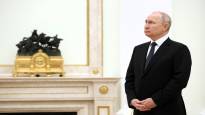MOSCOW When the extremist organization Hamas attacked from Gaza on Saturday, the earliest commentators expressed doubts that Russia’s handprint could be seen in the attack.
Among other things, the president of Ukraine Volodymyr Zelenskyi said it would be in Russia’s interests to foment conflict in the Middle East.
Kremlin spokesman Dmitry Peskov denied Zelensky’s accusation. Peskov has said that Russia is in contact with both sides and urges them to avoid bloodshed.
No evidence of Russian involvement in the Hamas attack has been presented. Ukrainian claims that the mercenary company Wagner trained Hamas fighters sound vague.
– Among Hamas’ allies, only the Russians have experience using drones with launch mechanisms against enemy equipment, National Resistance Center of Ukraine argued.
Unmanned aerial vehicles have been used in conflicts in the Middle East long before Russia’s war in Ukraine. Both Iran and the Lebanese Hezbollah it supports have drone expertise.
Russia, on the other hand, has blamed the United States About the failure of peace projects in the Middle East.
President of Russia Vladimir Putin said Tuesday that the United States has sought to monopolize Middle East peace efforts and that the escalation of the conflict is a sign of the failure of that policy.
Of course, Russia may hope that the escalation of the conflict in the Middle East will take US attention and resources away from supporting Ukraine. Russia could also enjoy that if the crisis weakened the Democratic president Joe Biden prestige in domestic politics.
Russia’s game in the Middle East is not clear-cut. Russia has maintained quite practical relations with Israel, and it is not in its interest to spoil them.
Israel has not joined the West’s embargo and has refrained from supplying weapons to Ukraine. Putin and Israel’s current prime minister Benjamin Netanyahu relations have been quite good.
The relations between the two countries are also affected by the fact that Russia has a significant Jewish minority, and Israel is home to many Jews who immigrated from Russia.
Fractures have been seen in relationships During Russia’s war of aggression in Ukraine.
Last year, the Russian Ministry of Justice began demanding that the activities of the Jewish Agency in Russia, which helps Jews immigrate to Israel, must be terminated.
In May of last year, the Minister of Foreign Affairs Sergei Lavrov angered Israel with his claimthat the leader of Nazi Germany Adolf Hitler would have been partly Jewish.
Lavrov’s reflections to the Italian television channel stemmed from the contradiction that Russia claims in Ukraine that it is fighting Nazism, but the President of Ukraine Volodymyr Zelenskyi is a Jew himself.
– I could be wrong, but A. Hitler also had Jewish blood. It doesn’t mean anything at all. The wise Jewish people say that the most virulent anti-Semites, as a rule, are Jews, Lavrov said.
Putin had to apologize to Israel for his minister’s speeches.
In the Middle East, Russia has so far striven to appear as an actor who can hold talks with all parties: Palestinians as well as Israel, Iran as well as Saudi Arabia.
Therefore, Russia does not want to ostentatiously support Israel, because it is important for it to maintain good relations with other countries in the region as well.
The war of aggression in Ukraine has brought Russia closer to Iran, which supplies Russia with drone equipment. Still, Russia does not necessarily want to appear only as a friend of Iran.
On the other hand, good relations with Arab countries and especially with Iran’s old adversary Saudi Arabia are also important for Russia.
Russia and the Saudis have cooperated on the oil market in order to control price developments.
The current conflict, on the other hand, is a blow to the crown prince of Saudi Arabia Muhammad bin Salman attempts to normalize relations with Israel.
So Russia has a lot of work to do to keep all these relations in some sort of balance.
Of course, Russia speaks in many voices. Propaganda horns have tried to harness the outbreak of violence for Russia’s own purposes.
Russia has tried to spread the claim that weapons supplied to Ukraine by the Western powers have ended up in the hands of Hamas.
Ukraine’s military intelligence, on the other hand, already said on Monday that Russia had delivered weapons it had received from the Ukrainians as spoils of war to Hamas in order to smear Ukraine.
Editor-in-Chief of the Russian state RT channel Margarita Simonyan again used the flare-up of the war to make fun of those Russians who have moved to Israel because of Russia’s war of aggression against Ukraine.
– A country that does not go to war with its neighbors will go to war with its neighbors again. We are waiting for the Russian pacifists to get out. Actually, no, we don’t wait, Simonjan wrote on his Telegram channel.
The most famous Russian who immigrated to Israel is probably the singing star Below is Pugachova. Her husband, a comedian Maxim Galkin has openly opposed a war of aggression against Ukraine.
Outside of the propaganda war, Russia may not be the most central player in the current crisis. It does not have the kind of leverage that could be used to bring both Israel and Hamas to the negotiating table in the current situation.
Actors in the Middle East do manage to cook up conflicts without Russia’s help, and it would be by no means harmless for Russia to incite an uncontrollably expanding conflict in the Middle East.
It could even jeopardize the foothold Russia has gained in the region, military bases in Syria. In Syria, Russia, together with Iran and Hezbollah, has kept the president standing Bashar al-Assad administration.
The balancing act is also reflected in the fact that Russia has advanced anti-aircraft systems in Syria, but it has allowed Israel to carry out airstrikes against Syrian military targets and Iranian-backed forces.
